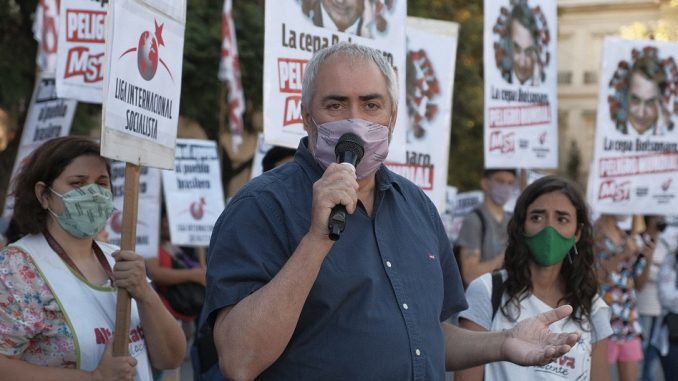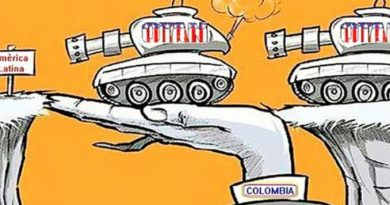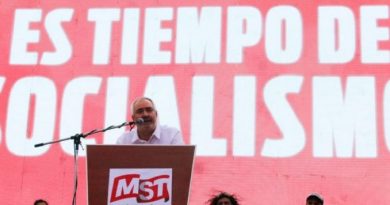Towards the 1st World Congress of the International Socialist League
Interview with Alejandro Bodart
There are just a few days until the start of this internationalist event. Headquarters, It will be Buenos Aires and will have representations from all the continents. In a world still affected by the consequences of an impressive pandemic, revolutionaries prepare to face the challenges of the next stage of the political and class struggle. In this interview, Alejandro Bodart, coordinator of the LIS and leader of the MST-FIT Unit, answers a series of questions present in the militancy and the vanguard of the left.
In a few days the 1st World Congress of the LIS will be held, Tell us the origin of this project? How does it start?
The LIS was formally born in May 2019. It is the confluence of Anticapitalistas en Red, organization that numbered different revolutionary socialist parties, including the MST, and colleagues from the SEP of Turkey, later joined by colleagues from La Lucha de Pakistan and different organizations until it is what it is today, an organization that brings together colleagues from 5 continents and more than 25 organizations worldwide. It is a project of regrouping of revolutionaries with the intention of learning to work from different traditions to gradually shape a new revolutionary tradition with the implementation of a healthy method and a principled program.
There was after the fall of the wall, a period of ideological offensive of imperialism that posed "insurmountable capitalism, socialism failed ". What world has been shaping from then until now?
The fall of the Wall and everything that followed was a very contradictory period. On the one hand, there was the loss of the countries where the bourgeoisie had been expropriated and a capitalist restoration process began that hit the consciousness of the mass movement and was used by imperialism to launch the campaign that capitalism was the only system and that socialism had failed. Now, It also had another component that many left-wing currents minimized or did not understand, which was the fall of Stalinism., the most monstrous apparatus that arose within the working class, which was responsible for the major defeats that occurred after the triumphant October Revolution (1917) Until that date, and that opens a new period where the possibility of overcoming the crisis of management began to be more raised than before. Have passed 30 years from that moment, this is a completely different world. What prevails is the global crisis of capitalism that has different aspects: the economic crisis, the environmental, the sanitary and the social one that opens many, many, many possibilities. The spandemic, period that we are going through, again he will put all the contradictions to the surface. After the crisis of 2008 and the combination with the pandemic, A period opens where the revolution and the counterrevolution are going to meet again and we are going to great events of the class struggle for which we must prepare.
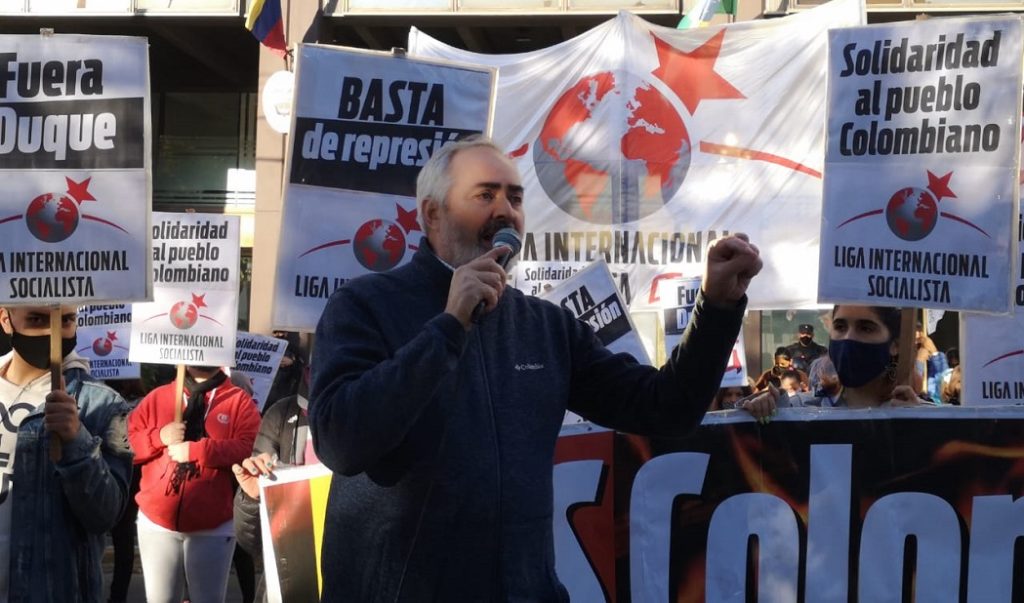
Out of that picture, let's say "objective" of the political process and class struggle, Normally you talk about the crisis of the currents of international Trotskyism and that is a starting point in definitions of the LIS project. Could you comment on what analysis you do??
Trotskyism, which is the most advanced current of Marxism, has lived through a very important crisis since the death of its founder León Trotsky and the triumph, after a while, of Stalinism over Nazism. This opened a period of much marginalization of Trotskyism, within the framework of which Stalinism was strengthened. The currents that were left to maintain that legacy, quickly, through tremendous political and methodological errors, whose analysis is not the reason for this note, led a disintegration of the International, of the Fourth International, in different currents that were made each one by its side. And that they were acquiring different traits: or sectarian, to protect yourself from a very hostile environment, or opportunists to look for shortcuts. Over the years, some of these currents were putting together international currents, that were trying to be hegemonic projects. Small international, who believed themselves to be the owners of the truth, and that in general were built in dispute with other. That period, that one cannot analyze it today with the "Monday newspaper", without seeing all the contradictions of the time, and that, in that frame, Trotskyism had to go very against the tide, which has its virtues and also had many defects. But those international projects, linked to a "mother party" and to small currents that tried to build themselves around completely hegemonic conceptions, finished. Today it is evident that, if we want to overcome these problems, we must work from the confluence between the different traditions that have been formed, to see if a new tradition is made that recovers the best of each of these currents and considers overcoming that stage. The currents that do not understand this and that continue to work for "mother party" projects, and believing that the construction happens to convince the rest of its own tradition, and that the rest of the traditions are centrist, opportunistic or sectarian, and that they do not have a policy to converge, are entering into crisis and we are seeing it in many organizations. Also in those organizations that, for the diaspora, they were transformed into National Trotskyist organizations. The LIS comes to try to overcome this stage, without self-proclamation. It is a small contribution to try to converge between the different currents. Overcome the stage of the mother party and go to an organization where you can live together, even with nuances, with some differences, while trust is being built, as to build that tradition, within the framework of a method, healthy work, of a true democratic centralism. Recovering the tradition of what were the Bolsheviks and Bolshevism, which was later distorted by Stalinism. And that even many currents of Trotskyism have suckled that insane method, more linked to Stalinism than to Trotskyism itself. Y, Besides, based on a class independence program, and with the north in the workers' government, workers' self-organization, permanent mobilization and socialist revolution.
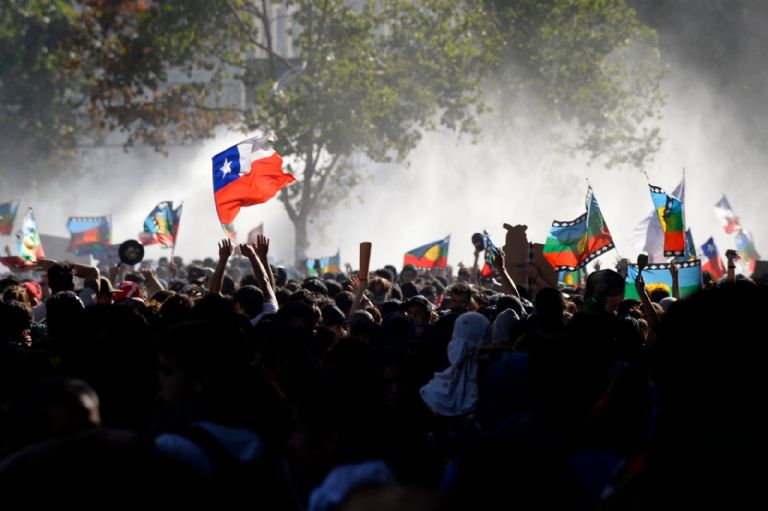
More topics, background, conceptual. We read you write as a definition, that we are going through a stage where "the world revolutionary process is normalized". For the new militancy, worker and youth of the MST and the LIS: explain that to us, please.
The issue of "normalization" is a complex issue that, Of course, in a short time it is difficult to specify, which is the reason for unilateral interpretations many times. The crisis of revolutionary leadership did not stop the world rise, Rather, it produced processes such as the expropriation of the bourgeoisie without the working class in many places having a preponderant role., but the peasantry; and in others, although the proletariat was there, did not have a revolutionary leadership in front, but petty bourgeois leaderships or Stalinist leaderships. Nevertheless, the revolutionary process went far beyond what had been the classical scheme, which was that of the Bolshevik Revolution (1917), where it could be realized from the fact that the working class was the social subject and the Bolshevik revolutionary party, the political subject. That scheme, it broke in the postwar period and has given rise to many debates, many discussions, many misunderstandings. Now, I believe that the process is being normalized again and that, for the fall of Stalinism, by the crisis of capitalism, today is very difficult or almost impossible, We could say, although you never have to say totally impossible, that without the mobilized working class and a revolutionary party we will be able to defeat the bourgeoisie in a country and much less internationally. In that sense, we are returning to what was the normality of the first postwar period: since there are no revolutionary parties, revolutions were lost; but after the second postwar, this abnormality occurred which was the rule. And today many times this, which highlights the need for a policy towards the working class, to strongly reaffirm the strategy of building a revolutionary party, Many, how the working class is reorganizing and still has a hard time intervening as a class, and this in turn makes it difficult to build a party, and not having left, this also in turn slows down the rhythms of recomposition of the working class. The sea, that feed each other, many fall into skepticism and look for shortcuts. Others become skeptical and fall for sectarian propagandism. Well i think not, that you have to have confidence that it is the beginning of a normalization process where the working class will gradually re-learn, will be recovering their organizations, will be playing a more active role. Today the working class is more numerous than ever, but it's a young working class, inexperienced, that comes from Stalinism, that much of the tradition that led, in the first postwar period and in the second, to play a determining role. And in that process, progress will also be made in the construction of a revolutionary party., because there is social polarization and just as there is a right that is growing, and you have to pay attention, in turn there is also space for the left and, as shown here in Argentina, can be capitalized and much more could be done. In that sense, I believe that there is a return to normalize the world revolutionary process, taking as a point of reference what we all have as a historical reference, What is the Russian Revolution and everything that happened there.
There are controversies, on the world left. And also in Trotskyism. For example, when you talk about left-wing projects on a national scale in Argentina, you define that there is 3. At the world level, does this pattern repeat itself??
We could say yes, that there are also sectarian projects on a world scale, opportunistic projects and ours that tries to find a way out that is not without errors. Although it is still a scheme. Because then you have to look for logical particularities that exist in each case. But schematizing we can say that skepticism, carried by one side, those sectors that fall in search of shortcuts because they do not believe that in the historical period in which we live the issue of socialism is raised, but they see it for an indefinite future or many disbelieve until it is raised in the future. And this leads them to shortcuts and to seek strategic alliances with reformist sectors., to abandon the construction of the revolutionary party, to dissolve into broad undefined parties or to confuse revolutionary processes with leaderships and therefore follow many of the nationalist leaderships, leftist or progressive, or a "new left" like Siryza, etc. I'm talking, eye, since Trotskyism. Yes we zoom to the left more generally, I think that the popular front left is integrated into projects, in many cases even bourgeois, how we are seeing, for example, in our country with the leadership of the Communist Party or the RCP (Maoism). that has joined a front commanded by the traditional bourgeois party of Argentina that is Peronism. Or in the United States to the Democratic Party, beyond acting from the DSA. But everyone is moved by this point of seeking alliances with the old theory that it is not proposed that the proletariat take center stage, Rather, it has to seek alliances in sectors of the national bourgeoisie, which is a complete nonsense shown by history that is not going anywhere.. Or as I said to you for the issue of not believing (in the revolution), seek rather democratic changes or radical reforms, that are also not given and abandon the strategy on that path. And there are other comrades who do not abandon the strategy of essentially building the party of Trotskyism., although many times they fall into sectarianism to protect themselves from the mass movement. And in this way they are also an expression of skepticism and that is channeled through trying to maintain a "purity" that makes them inert to intervene in the mass movement.. And also unlike the others, but falling into the same, they often confuse the addresses with the processes and in this way they do not intervene in the processes. Oh well, These are debates that have a similar root at the national level or that go even deeper. This is seen many times in Trotskyism, who has ideologically strong positions, but sectarianism leads them to not have a policy to take advantage of the opportunity. Then there are we who are trying and that obviously we are not the only ones. There are companions everywhere, that's why the LIS exists, because we are finding partners in many places, who try not to fall into skepticism, not to fall into opportunism or look for shortcuts, nor in the sectarianism of not participating in the mass movement and all without losing the strategy, having tactical policies. Although there are debates and discussions, logically, the LIS has been formed because in a lot of places there are many colleagues who come from traumatic experiences in international organizations that have had bureaucratic vices, vices of national Trotskyism, single party and who have been reflecting, and this is the confluence that allows to form the LIS to combat these deviations of different sign and see if in a period of time we can make a great international based on a great regrouping, a great revolutionary program, a healthy method that allows you to fuse the best traditions of each one and return in a sense to what was Bolshevism. Because that is what the possibility of us creating the paths to overcome the crisis of management that will come from now on is all about., starting from the class struggle and if the proletariat responds with increasing force and energy. If in this way the democratic organisms are created so that the working class can solve and in parallel to that, the match. They are topics that are debatable because there are complications. There is a very favorable situation, a great global polarization and at the same time many contradictions that we need to discuss how we overcome.
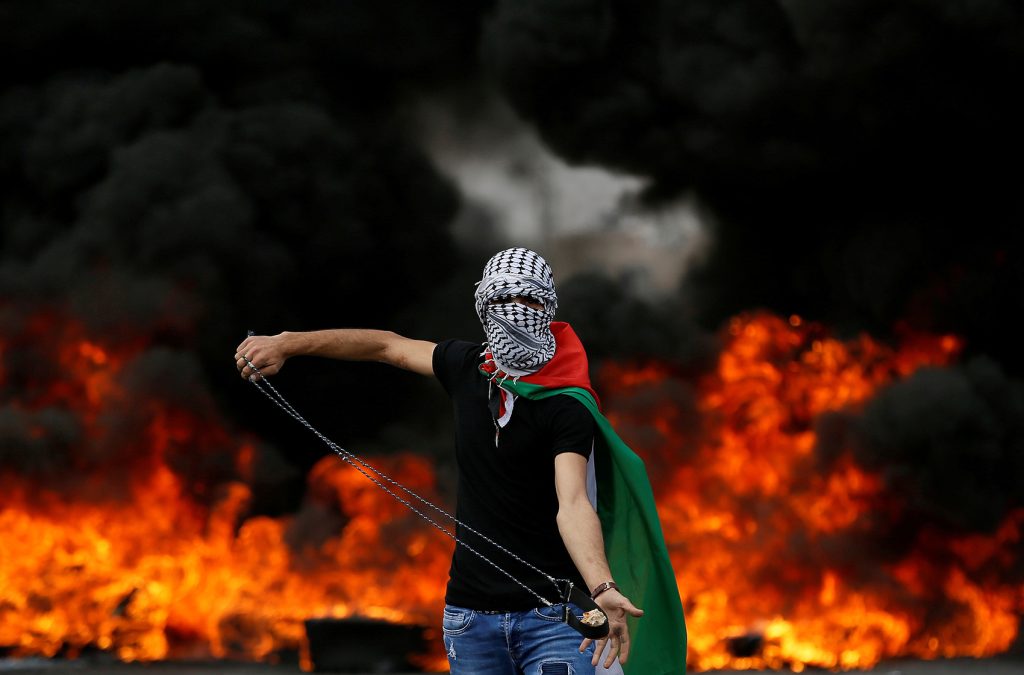
It is clear that capitalism got to the pandemic badly, unable to overcome the crisis of 2008 and COVID amplified everything. What is the bourgeois and imperialist agenda for the post-pandemic?
The crisis of capitalism is very deep. Comparable to the crisis of the 1930s of the last century, late 19th century. It is a structural crisis, systemic that, as I said before, covers different aspects. Imperialism has lost its strength. He believed that after the fall of the USSR it would transform itself into an increasingly hegemonic imperialism and become stronger., but the weakening he suffered from losing a partner who allowed him some control over the mass movement, what was the role that Stalinism played, made him assume all the contradictions and he was weakening. And a competitor has emerged, what is china, that questions its hegemonic role and that has generated an inter-imperialist dispute, that on the horizon can propose the alternative of a confrontation, Even in the military field, although today I am in the economic field. There is a preparation of the two superpowers in that sense. Although there is a rising power that is China and one that is weakening, and has lost the hegemonic role. Con Trump, the problems for imperialism became more acute. Biden tries to reassemble a power bloc to confront China and try to contain the rise, but the withdrawal from Afghanistan shows the difficulties it has in responding to an increasingly conflictive world. But they will try. They have put billions and billions of dollars at the service of saving large corporations in crisis. They will try from now on, that the cost of all that is paid by the peoples, with more super exploitation and more misery. That will be the agenda that will prevail. We are seeing that the closures of factories and companies continue. Capitalism is at a stage where it increasingly evolves towards financial fraud to the detriment of production. And that is what is behind the crisis itself, that feeds, because many of those trillions of dollars that they have invested, instead of going and strengthening production, they keep going to the timba. And there are thousands of companies, even the most important, what are “zombie” companies, because they live with forged balances, to hold from, precisely, of all the contributions that the States give. There is a tremendous indebtedness of the States, of companies and, in general, of people. We are at a time where the economic crisis, far from having overcome despite some rebounds, runs its course. And there is going to be a counteroffensive of labor flexibility, of attempting adjustment plans to pay off debts, As wealth accumulates more and more in fewer hands. And there is a sector that is betting on far-right exits, because he is aware that none of this will be able to achieve, nor will it be able to stabilize, and return to achieve that the rate of profit stops decreasing, if not with a defeat of the mass movement. And that is why there are sectors that bet on far-right exits, and grow from the trumps, the Bolsonaro, the Milei, the Espert, the Vox in Spain. There is an attempt to strengthen those types of exits. Now, in perspective, they will collide with the rise of the mass movement, Although there is going to be a growing polarization and it is difficult for it to be dragged into a situation of more misery or to the barbarism that is proposed, without fighting. Like youth, that plays a fundamental role, not only in social struggles, but also in democratic struggles, because on the way to implement all these plans, governments become increasingly authoritarian and repressive. In turn, climate change is also leading generations and generations to confront it and mobilize. The same happens in the face of the exacerbation of the problems against women, against dissent, religious sectarianism. We are going to an increasingly troubled world, where in turn rebellions and revolutions are going to tend to generalize and collide, and there will be a confrontation between revolution and counterrevolution every time more clearly.
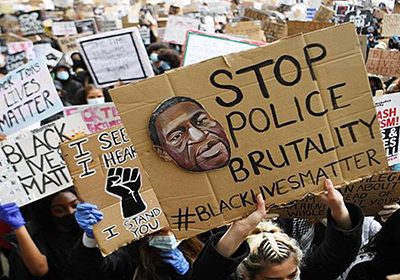
Returning to the plane of the objective and the political and class struggle. The LIS defines a stage of acute polarization as a current trait, that gives emergent expressions to the right and space to the left, how to capitalize that "space"? Are there global trends to identify?
Social polarization grows in the world, and there is a liquefaction of the center and the traditional political forces, that drain left and right. And it has to do with the polarization that will tend to occur in the class struggle. We are going to a world where the extreme right will grow, possibly because it is the one that has a program to get capitalism out of the crisis: lead the working class to barbarism, with loss of conquests, of the few that remain, and advance in removing rights and super exploitation. But at the same time there is another trend, it even feeds on this contraposition, what is a trend to the left. And of course, where there are revolutionary forces, as in Argentina, may end up being funneled into firmer expressions programmatically, How is the Left Front. And where there is no, the same is advanced to expressions like that of a Pedro Castillo, which is the most radical of the political spectrum (in Peru), beyond that your inconsistencies quickly come to light. Or in Chile, This polarization occurs with people from the Broad Front, that already in the revolutionary process betrayed. Or a Petro in Colombia. But it is a turn to the left that also fuels the possibility of forming revolutionary organizations., that will have an expression in the class struggle: more rebellions, more clashes. At the same time, at the level of the working class, there is still a very incipient process. It costs the working class to come out as a class. And this makes it difficult to form democratic organizations.. Still has a hard time getting out, still the weight of bureaucracy and treacherous leaderships, and the economic crisis itself, generates trends that make the working class is not developing its full potential. Participate in the struggles, even from rebellions, but more on an individual level. As I said before, this creates problems, even for the construction of the revolutionary party. But at the same time, as there is a space to the left, the formation of a revolutionary party can help this process in the working class to develop and feed each other. That is why the strategic task remains the subject of revolutionary leadership and taking advantage of these trends.. There are organizations that tend to see only what is on the right. Some use the rise of the right to promote policies against populists, and so that an independent left does not emerge. The task of revolutionaries is to confront the right, but do not give in to the "siren songs" of unprincipled unity, but to remain independent of the different bourgeois factions. Understand that even in the confrontations that there will be between opposing camps in this inter-imperialist dispute, there is no progressive camp and therefore a third position must be maintained, Independent. You have to face, not just classical right-wing capitalist governments, but also the false progressives, even nationalisms that quickly turn reactionary and go against the working class and popular sectors. Because it is only the only way for a revolutionary embryo to emerge that at some point can define the situation in favor of the working class.
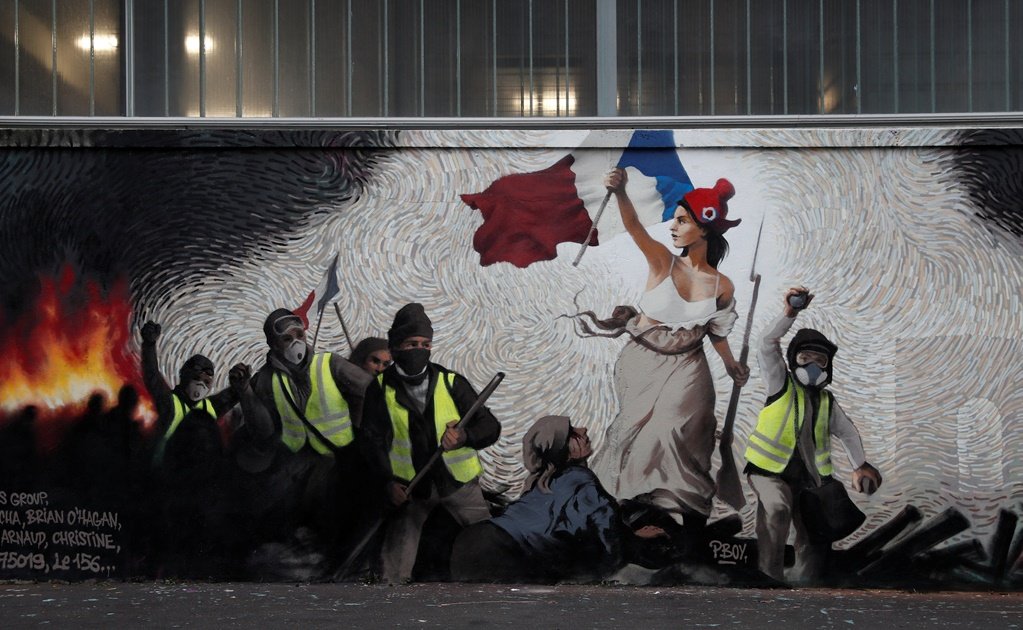
Good, to close. Expectations with the 1st World Congress, objectives. What are you waiting for?
We had the objective of holding the 1st World Congress in May of last year. The pandemic forced us to postpone it and we have high expectations that the leap we have been taking between the Conference, that kicked him off (mayo 2019, Barcelona), and this Congress, be consolidated and that new organizations that have been integrated allow us to advance in the construction, In the elaboration, and in the solidification of this project. We also have expectations that many organizations that are going to come as observers will advance in their integration and that Congress itself will allow another leap and go on the offensive to connect with other processes.. The LIS has been part of the main processes of the class struggle that have occurred in Latin America: in Chile, In colombia, in Peru. Also in the Middle East, as in Lebanon or that have occurred in Eastern Europe: in Belarus, for example. We are participating in the processes that are currently taking place in Africa and Europe. Thus, the expectation is that all this experience will be overturned and allow us to define the best policy, the best orientation to continue working, and from now on, also to consolidate the mechanisms of an organization with increasingly clear and in-depth methods. Shape an address, since what currently exists is a coordination that came out of the Conference, but we need to move in a more organized direction. We have planned to discuss our statutes, in addition to defining certain materials that make the world situation, towards the economy and orientations to intervene in the different continents, countries, regions and areas where we are established. In that sense, draw the greatest conclusions from the rebellions that have occurred, to be as well prepared as we can, and define campaigns and orientations. I am convinced that we are going to achieve it because of the very presence of colleagues who are going to participate, both most in person, some still for situations of the pandemic in a virtual way, but the mere fact of the companions who have guaranteed their presence, That for us pre-announces a successful Congress and in turn, when it is held in Argentina, it will also allow, that the militancy of Argentina can participate more directly: young people with the camp that they are going to organize and the different activities so that the youth and popular workers vanguard of the country have the opportunity to participate. First, with the Inaugural Act in Plaza de Mayo, as well as the different activities planned. I think it will also be a contribution to the Argentine revolutionary process. Thus, and summarizing: the main objectives are to draw the greatest possible conclusions from the whole new situation that has opened, of the revolutionary processes in which we have participated (and we have participated in many), and try to define the world situation as best as possible and from there specify the tasks that we have in the future. Clearly define an orientation, consolidate progress, incorporate the new, o strengthen ties with the new organizations that have been integrated or with which we are related. It would be ideal if we could define campaigns to act in the next period and consolidate the organization, address, statutes, a magazine as a press organ and a stronger internal organization.
interviewed: Mariano Rosa

